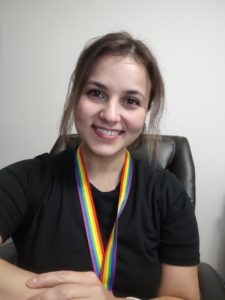Dr. Tamara King, Alumna Spotlight
 Senior DMPK Scientist, Pharmaceutical Candidate Optimization (PCO) Department, Bristol-Myers Squibb
Senior DMPK Scientist, Pharmaceutical Candidate Optimization (PCO) Department, Bristol-Myers Squibb
Hometown: Togliatty, Russia
BS in Forensic Chemistry (2014)
LinkedIn
When and why did you decide to major in forensic chemistry?
I was debating on the major (biochemistry or forensic chemistry) up until my orientation. I knew I wanted to do science ever since I was in middle school. I was obsessed with Sherlock Holmes and how he used the scientific method, specifically his use of chemistry in solving crimes. When I first applied at Ole Miss I declared biochemistry as my major, but changed my mind during orientation and became a forensic chemistry student instead.
Please share some significant accomplishments or favorite memories from your time at UM.
I was usually on the Dean’s or Chancellor’s list for most of my undergrad, and I was also invited to an American Chemical Society awards dinner where I got an “Outstanding Forensic Chemistry Award.” I enjoyed studying, struggling, and winning with my classmates. We had a very small group and became close friends.
Describe the educational/career path since graduation.
After I graduated from the forensic chemistry program, I realized that I really enjoyed research. I was fortunate to do research with Dr. Willett in toxicology and during my crime lab internship in Batesville Crime Laboratory. I joined the graduate program at the UM School of Pharmacy under Dr Bonnie Avery. Two years in, she got a job offer at the University of Florida College of Pharmacy. Our entire research group moved to Florida, where I enrolled in a PhD program in Pharmaceutical Sciences to continue my postgraduate education. I got my PhD in Pharmaceutical Sciences with a DMPK (Drug Metabolism and Pharmacokinetics) track in 2020, then I proceeded to do a postdoctoral fellowship at the FDA in the Division of Applied Regulatory Sciences (DARS). Exactly one year into the postdoc I got a job offer at Bristol-Myers Squibb as a Senior DMPK Scientist in the Pharmaceutical Candidate Optimization (PCO) department, where I am currently employed.
I serve as a DMPK representative on several cross-disciplinary teams in early drug discovery. My primary duties include preclinical in vitro and in vivo study design, analysis, and representation of the integrated data. Together with other subject matter experts and members of the early drug discovery team we optimize the lead molecules and nominate candidates for the first-in-human trials.
What is the value of studying forensic chemistry in today’s world?
The forensic chemistry program allows you to explore multiple facets of applied chemistry. You get a solid understanding of analytical chemistry principles with an additional bonus of extra sciences (e.g. forensic biology). The program allowed me to get a real glimpse into what a crime laboratory tech job would be like and made me to realize that I was more into the research of pharmaceuticals. While I could have easily got a job in the field (like many of my classmates did), it equally prepared me well for the hardships of graduate school that I have successfully conquered. The uniqueness of the program is in its interdisciplinary approach, you get to look into various subjects and draw conclusions from all the different sources. To me this was the advantage of the program, and ultimately was a major stepping stone to my dream job.